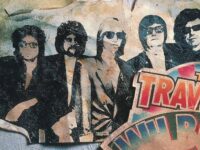Jeff Lynne’s time with the surviving Beatles in the ’90s yielded two hit singles – and partial work on a third song, “Now and Then,” which is apparently slated for release soon.
“Free As a Bird” reached No. 2 in the U.K. and No. 6 in America in 1995. “Real Love” followed in 1996, peaking at No. 4 in the U.K. and No. 11 on the Hot 100. All three tracks were leftover demos created by the late John Lennon with modern-era contributions from Paul McCartney, George Harrison and Ringo Starr.
Many were the fans who longed to be a fly on the wall as the trio reconvened for the first time since 1970 sessions for “I Me Mine.” Lynne, the Electric Light Orchestra mastermind who would produce these reunion tracks, is proud to say he was that fly.
Things started tentatively, however, as the sprawling Anthology series was still being compiled. “When we got in the room, they hadn’t been in the same room for, like, 20 years or so – the three of them, all at once,” Jeff Lynne later told Itv News Central.
They would break the ice by returning to the old days. “We sat and listened to these tales of the Beatles, and all of the things you ever wanted to know,” Lynne added. “I was just thrilled to bits with that. I was in the club. There was just them three, and me – that was it.”
For a confirmed Beatlemaniac like Lynne, working with members of the Fab Four had always been a dream. Beginning in the late 1980s, every one of them came true.
It started when Lynne was tabbed to produce George Harrison’s comeback album Cloud 9, which led to the formation of the Traveling Wilburys – an all-star amalgam that included Bob Dylan, Tom Petty and Roy Orbison.
“George said to me one night, when I was working on Cloud 9: ‘You know what? Me and you should have a group,'” Jeff Lynne later told Dennis Miller. “And I said: ‘That’s a good idea. Who should we have in it, then?,’ not thinking anything, really. And he said: ‘Oh, Bob Dylan.’ I said: ‘Oh, yeah, that’s great. That’s a great idea.’ [Laughs.] It just went on and on. It was just a fantastic time.”
Lynne would ultimately create two albums with the Traveling Wilburys, before going on to oversee the creation of “Free As a Bird” and “Real Love.” Lynne also produced solo albums for Starr (1992’s Time Takes Time) and McCartney (1997’s Flaming Pie), and another with Harrison (2002’s Brainwashed).
“You do actually get what you wish for,” Lynne added, “and I really did wish to have out with and play with the Beatles themselves – and all of my other heroes, like Del Shannon and Roy Orbison. I got to do all of them, and nobody let me down. So, it’s always been a great feeling for me – having looked at them from the outside, and then suddenly I was in the middle of it all, doing those singles ‘Free As a Bird’ and ‘Real Love.'”





I could tell from the Anthology show that the cracks in the reunion started to show fairly quickly. Ringo, in particular, looked by the end of it that he’d rather be somewhere else. I was hoping for some insight into those sessions.
I want to know why Jeff Lynne was there. Never liked his production style.
George and him were friends, and “Cloud Nine” is wonderful.
Some folks don’t have taste I guess.
Not to mention that they were both in the Traveling Wilburys. LOVE Jeff Lynne!!
You and nobody else.
I believe Jeff did a great production number with this single.
Especially when you consider the technology of 20-years ago.
I heard a demo recently. Someone had taken Lennon’s original Free As A Bird and reworked it himself. Clear as a bell, too.
didn’t like what he did with dave edmunds as a producer, but he did a good job on the 2 beatles tunes.
That was the rumor in the mid-80s. Heard it first spoken by Alan Hunter on MTV in the summer of 1985. The Beatles would re-form, Jeff would join, and ELO would vanish. This is after Secret Messages, and no one knew about Kelly Groucutt’s departure back then, but before Balance of Power.
A funny thing. Balance of Power was a “contract fulfillment” album. Jeff owed that one more album. That same record company refused to let him record Secret Messages as a double album, citing a lack of interest from the buying public. Me, I think it was all about revenue streams. Double albums weren’t priced twice the price of singles, only about 50% higher (say, $9.99 and $14.99) back then.